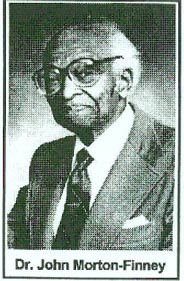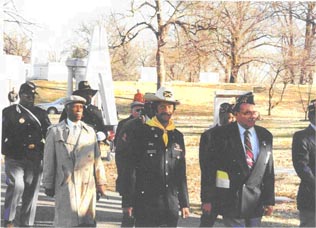Trooper John Morton - Finney
24th U.S. Infantry, World War I
George Hicks, III
Carmon Weaver Hicks
January 2005
John Morton-Finney was born on June 25, 1889 in Uniontown, KY. He was the son of a slave whose ancestors migrated from Ethiopia to Nigeria. He grew up in a family of seven children where poetry readings and political debates were evening activities. His mother died when he was 14 so his father sent the children to live on their grandfather’s farm in Missouri.

Morton-Finney served in the 24th U.S. Infantry Regiment from 1911-1914 and went to the Philippines. He rose to the rank of sergeant and applied for an officer’s commission. In 1913, his commander told him that, although he had the intelligence and the education to be an officer, he was disqualified due to his race. When the commander said that he wouldn’t be able to go to the officer’s club, Morton-Finney responded that he didn’t want to go to the officer’s club; he wanted to be an officer. He earned a citation from General John J. Pershing for his service in the Philippines.
Trooper Morton-Finney received an honorable discharge; then, earned his first college degree from Lincoln College in Missouri. He began teaching in a one-room schoolhouse but when World War I started, he returned to the military. He served in France in the American Expeditionary Force and saw the destruction; survivors of mustard gas, men spitting up parts of their lungs, and the graves of 30,000 Frenchmen.
After the war, he earned degrees in math, French, and history. At Lincoln College, he heard about a new French teacher, Pauline Ray, with a degree
from Cornell University. Morton-Finney signed into her class and won her
heart.
They were married and moved to Indianapolis in 1922. He taught junior high
math and social studies at Indianapolis Public Schools #27 and #17 where
he also served as principal. In 1927, he was hired as one of the first teacher
at all-black Crispus Attucks High School (CAHS). He served as head of the
foreign
language department - teaching Greek, Latin, German, Spanish, and French.
Students also learned life skills such as how to set goals, plan their futures,
and
take responsibility for their actions. They learned that racism is an unacceptable
excuse for failure and developed a deep respect for their history and culture.
According to his daughter, Gloria, he invited presidents from black colleges
to speak to the students. He made it possible for Crispus Attucks students
to obtain scholarships to attend college. Students had a view of going someplace
beyond CAHS.
During World War II, he was cited for directing the rationing tickets program
for African American in Indianapolis. Various merchandise such as meats,
sugar, butter, gasoline, and rubber were strictly rationed. Many items were
especially
scarce but rationing guaranteed that everyone received equal amounts of raw
materials (Dolan, 1992).
John Morton-Finney’s love for learning remained constant. While at CAHS, he earned master’s degrees in French and education from Indiana University. In 1935, he earned his first law degree and four more after that. During his life, he read three or four books at a time. Twenty books would be stacked beside his bed with five sharpened pencils and the television turned to the news. During an interview with Wallace Terry on his 100th birthday (Terry, 1990), Morton-Finney said “I can get interested in so many things. There is so much to know in the world. And it is such a pleasure for me to learn. Besides, a cultivated man would never say - I finished my education - because he graduated from college. There is no end to learning.” He credited his grandfather with giving him advice that served him well. He believed that moderation in all matters is the key to a long life.
John Morton-Finney - educator, lawyer, and humanitarian - earned 12 degrees
including a law degree from Indiana University and a degree from Butler University
when he was 75 years old. He practiced law until he was 106 and died on January
28, 1998 at the age of 108. He received a full honor military memorial service
and was laid to rest at Crown Hill Cemetery.
Indianapolis Public Schools Board honored this dedicated teacher who taught
for 47 years. In 2000, they unanimously voted to rename the Center for Educational
Services to the Dr. John Morton-Finney Center for Educational Services. Commander
Carlton Philpot, who was the Chairman of the Buffalo Soldiers Monument committee
at Fort Leavenworth, KS, was the keynote speaker for the dedication.
Other honors bestowed on John Morton-Finney include an honorary doctorate degree from Martin University in 1991. His photograph appears with a short sketch of his life on the wall of honor. Martin University is the only higher education institution in Indiana that specializes in serving adults. The student population is 98% African American. Father Boniface Hardin is the University’s founding president, which opened its doors in 1987.
In 1998, Congresswoman Julia Carson made a tribute to Trooper Morton-Finney on the floor of the U.S. House of Representatives (Congress. Record, Feb. 4, 1998). In 2003, the IU Board of Trustees approved a residential house on the Indiana University Purdue University Indianapolis campus to honor Dr. John Morton-Finney that opened in 2004. The campus is developing a community of houses named for past heroes and community leaders. They want to build a sense of community among the students, the university campus, and the Indianapolis community. The goal is to create a sense of belonging for students to recognize that in becoming a part of the IUPUI family, they are part of something larger than themselves. Dr. John Morton-Finney would agree with that philosophy.

Tuskegee Airman, Buffalo Soldier – James Madison in white hat, American Veteran of Foreign Wars and others
Trooper John Morton-Finney’s memorial service
Crown Hill Cemetery – Indianapolis, 1998
References
- Carson, J. (February 4, 1998). Congressional Record. Washington DC.
- Dolan, E. E. (1992). Americans in world war 2: 1943. Brookfield, CT: The Millbrook Press.
- Hicks, G., III, and Hicks, C.W., (2005). Our journey with the buffalo soldiers. Printed in USA.
- Terry, W. (March 10, 1990). It’s such a pleasure to learn. Parade Magazine. Indianapolis Star.
